
Thailand, a country in Southeast Asia, borders on four other countries, including Myanmar (Burma, Cambodia, Laos and Malaysia) and the Andaman Sea and the Gulf of Thailand. reasons to visit the country Most of Thailand’s mountain ranges are located in the north and northeast of the country. The country has an average altitude of 287 meters and the highest point is Doi Inthanon with an altitude of 2,565 and the lowest point is on the Gulf of Thailand with an altitude of 0 meters.
Doi Inthanon
Doi Inthanon is the highest mountain in Thailand, reaching an altitude of 2,565 meters. The mountain was previously known as Doi Luang, which means “Big Mountain” in Thai. The mountain is home to picturesque waterfalls in the low and mid elevations, such as the Mae Ya waterfall. The upper elevations of the mountain are characterized by a dense canopy of mountain forests, dominated by oaks, tea plants and magnolia species. The dense canopy facilitates the growth of vegetation such as orchids, lichens, mosses and ferns. The low elevations are home to deciduous forests.
The entire mountain and surrounding areas, along with their flora and fauna, have been locked up in Doi Inthanon National Park. The mountain is home to 400 bird species, including rare species native to a few mountains in Thailand. These birds include the green-tailed seabird and the ash-throated warbler. There are gorals, bears and deer roaming the mountain next to snakes and other small animals.
The Ping River and its tributaries come from the mountain. The particularly fertile mountain slopes have been used for agricultural purposes by local communities. A paved road was built by the military in the 1970s, which made tourist activities easier and accessible on the mountain.
Doi Pha Hom Pok
The Doi Pha Hom Pok is the second highest mountain in Thailand at an altitude of 2,296. The mountain is located along the Burmese border in Chiang Mai and is enclosed in Doi Pha Hom Pok National Park. Its name translates as “mountain covered by a blanket”, to designate the thick forest visible at its higher altitudes.
The dense forests surrounding the mountain facilitate a rich undergrowth of ferns, lichens and mosses. Many species of orchids are also found on the mountain. Mixed deciduous forests are found on the mountain as well as dry dipterocarp forests at lower altitudes. There are mammals such as wild boar, macaques, gibbons and barking deer and 300 bird species.
There are also many geysers and springs at the foot of the mountain, many of which are major tourist attractions. Waterfalls like Tat Mok and Bhoo Muan are also attractions on the mountain. Tourist activities on the mountain are well coordinated in order to preserve the largely unchanged ecosystem.
Doi Chiang Dao
Doi Chiang Dao, at an altitude of 2,225, is the third highest peak in Thailand. The mountain is part of the Daen Lao range of the great Shan Hills. Considered 250 million years old, the giant limestone rises in the plains where the city of Chiang Dao is located. The mountain is a paradise for birds and has rare species such as the Hume pheasant and the rusty-skinned Pitta. The mountain is also home to rare flowers and butterflies.
Chiang Dao National Park hosts the peak and manages all tourist activities on its territory. Different types of forests exist in the mountain, which is also home to a small number of indigenous tribes. The flora and fauna of the mountain remain intact.
Phu Soi Dao
Phu Soi Dao is the fifth highest peak in Thailand, with an altitude of 2,120. The mountain is part of the Luang Prabang mountain range along the border with Laos. A waterfall of the same name 5 on the mountain is undoubtedly one of the main attractions of the summit. The mountain is characterized by virgin forests, mainly pines and many rivers and streams. The peak is enclosed in Phu Soi Dao National Park and is home to an abundance of flowers and birds.
Impact on tourism
Khao Kacheu La at 2.152, followed by Phu Khe (2.079 meters), Phu Lo (Doi Lo) (meters 2.077), Doi Mae Tho (Doi Lang Ka) at 2.031. , Doi Mae Ya (counters 2.005) and Doi Phong Sa Yan (counters 2.004). The mountains of Thailand have become increasingly popular tourist destinations due to their unique characteristics. Government efforts to develop sustainable tourism infrastructure have facilitated this surge in tourism.
| Rank | The tallest mountain in Thailand | Elevation |
|---|---|---|
| 1 | Doi Inthanon (Doi Luang) | 2,565 meters |
| 2 | Doi Pha Hom Pok | 2,296 meters |
| 3 | Doi Chiang Dao | 2,225 meters |
| 4 | Khao Kacheu La | 2,152 meters |
| 5 | Phu Soi Dao | 2,120 meters |
| 6 | Phu Khe | 2,079 meters |
| 7 | Phu Lo (Doi Lo) | 2,077 meters |
| 8 | Doi Mae Tho (Doi Lang Ka) | 2,031 meters |
| 9 | Doi Mae Ya | 2.005 meters |
| 10 | Doi Phong Sa Yan | 2.004 meters |

